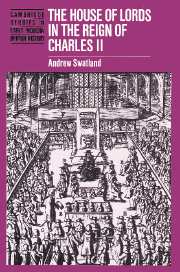Book contents
- Frontmatter
- Contents
- List of tables
- Acknowledgements
- List of abbreviations
- Note on the text
- 1 Introduction
- PART 1 FROM ABOLITION TO RESTORATION
- PART 2 MEMBERS AND THE BUSINESS OF THE HOUSE
- 3 Membership, attendance and privileges
- 4 Legislation
- 5 Justice
- PART 3 KING, LORDS AND COMMONS
- PART 4 RELIGION
- PART 5 POLITICS
- Appendix 1 Temporal members of the House of Lords
- Appendix 2 The bishops, 1661–1681
- Index
- Cambridge Studies in Early Modern British History
- Frontmatter
- Contents
- List of tables
- Acknowledgements
- List of abbreviations
- Note on the text
- 1 Introduction
- PART 1 FROM ABOLITION TO RESTORATION
- PART 2 MEMBERS AND THE BUSINESS OF THE HOUSE
- 3 Membership, attendance and privileges
- 4 Legislation
- 5 Justice
- PART 3 KING, LORDS AND COMMONS
- PART 4 RELIGION
- PART 5 POLITICS
- Appendix 1 Temporal members of the House of Lords
- Appendix 2 The bishops, 1661–1681
- Index
- Cambridge Studies in Early Modern British History
Summary
After the processing of legislation, the administration of justice was the most important and time-consuming function of the restored House of Lords. No fewer than 1,200 petitions and writs of error were presented to the House and its Committee for Petitions between 1660 and 1681. Over three-quarters of these were presented to the Convention Parliament and the majority concerned the restoration of ecclesiastical benefices. Most cases involved private individuals, and were of little interest to the majority of peers. But several were highly controversial, providing heated debates, and in some cases resulted in protests being entered in the Journal. The peers valued their judicial powers so highly that when any were challenged by the Commons they vigorously asserted their exclusive right to the administration of justice in parliament. Yet the Lords' judicature for this period has until recently received only cursory treatment from historians. Scholars have largely concentrated on the more controversial aspects, notably impeachments and judicial disputes with the Commons. By ignoring the more mundane aspects of their judicial responsibilities, impeachments and judicial disputes cannot be viewed in perspective. The purpose of this chapter is to delineate the Lords' contribution to the redress of judicial grievances, and in so doing, it will focus on the two main categories of law suits: appeals from the court of Chancery and writs of error.
One of the most significant developments in seventeenth-century parliamentary history was that the House of Lords acquired a judicature.
- Type
- Chapter
- Information
- The House of Lords in the Reign of Charles II , pp. 71 - 90Publisher: Cambridge University PressPrint publication year: 1996



